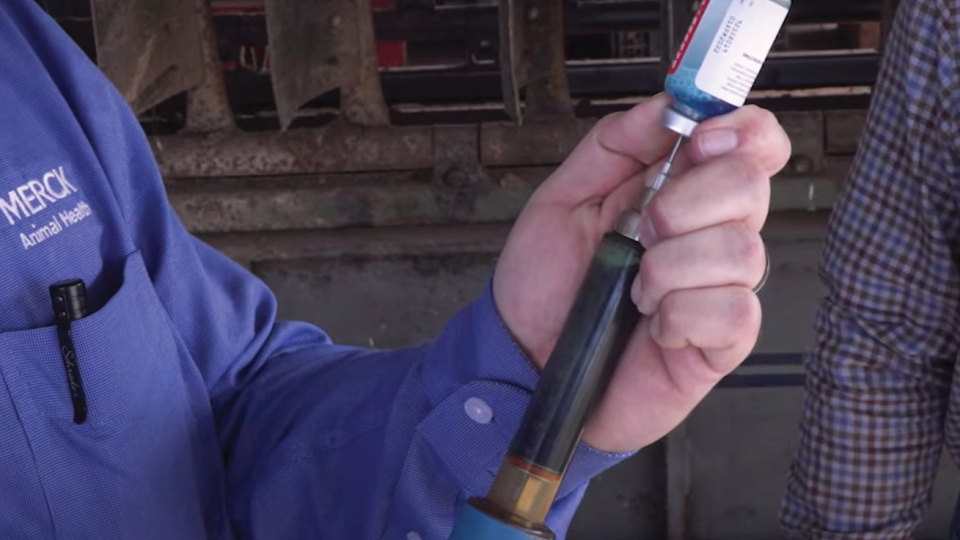Maximize your preconditioning program for healthier, higher-value calves
By Dr. Tim Parks
With today’s competitive marketplace, cow-calf producers are looking for more ways to positively differentiate their calf crop on sale day. One of the most effective strategies to demonstrate advanced calf health and performance is by implementing preconditioning programs. These protocols help ensure the long-term success of cattle, maximizing their value.
Preconditioning programs help boost the calf’s immune system and health status with the goal of better preparing calves prior to exposure to pathogens or stressors. Calves that have been dewormed, have received both primary and booster vaccinations and have been weaned at least 45 days prior to sale will be well-prepared for the next phase of production.

It’s no surprise cattle buyers recognize the value of buying preconditioned calves versus non-preconditioned calves.
PrimeVAC™ by Merck Animal Health is an example of a value-added program that focuses on respiratory and clostridial vaccinations as well as protection against internal parasites. It also includes optional implant protocols. It gives producers a clear guide of the steps needed to give calves the best start.
Vaccine types and timing make a difference
It’s been well-documented that abrupt weaning causes stress, which results in reduced function of the calf’s immune system and impaired ability to fight disease. If the calf is vaccinated during this time, its ability to respond properly to a vaccine is limited.
Vaccinating calves four to six weeks prior to weaning allows a calf’s immune system to appropriately respond to the vaccine while on their cow. It also provides enough time before their next vaccine, which is most likely when they arrive at a backgrounder or feedlot.
Both injection and intranasal vaccines can be considered. Intranasal options are delivered to the mucosal surfaces in the nose to avoid interference from maternal antibodies1 but still provide the benefit of a modified-live vaccine immune response. Both Bovilis® Nasalgen® 3-PMH and Bovilis® Nasalgen® 3 are administered in a single 2-mL dose that is easy to administer.
Nutrition also is very important. Providing creep feed that’s been formulated based on the calf’s life stage helps get it used to eating on its own and prepares the rumen for the next stage.
Fresh, clean, and cool water supplied via a water trough or automatic waterer versus water on the ground helps improve health and performance.
Calves with subclinical worm infections can have decreased feed intake, feed efficiency and poor immune response to vaccines. Allowing the worm burden to remain after weaning will reduce response to vaccination and increase sickness rates.
Deworming calves several weeks prior to weaning, doesn’t require gathering and processing through a chute, and can be highly effective. Using feed and mineral forms of Safe-Guard® (fenbendazole) require relatively little time and labor.
A preweaning implant is beneficial when retaining ownership and/or trying to put weight on calves pre- and postweaning.
Administering vaccines and dewormers in the least stressful times – and incorporating good nutrition and cattle handling protocols – sets calves up for success in the backgrounder or feedlot stage. It also helps producers realize the best return on their cattle investment.
New tool makes it easier
Herd Health Manager is a new online tool that guides producers and their veterinarians to build a customized herd health plan, and then it encourages them to print out a herd health record to share at marketing.
It provides a convenient way to identify products and protocols to be used at key prevention points and to keep detailed health records. Veterinarians and producers can easily document vaccination, parasite and reproductive protocols, and then it creates a veterinary-certified health history for producers to use at sale time.
A password-protected account can be created in less than a minute at HerdHealthManager.com. For more information about PrimeVAC, contact your veterinarian or visit MAHCattle.com
References
- Merck Animal Health Study MS-N3PMH-3-19: Efficacy of vaccination in colostrum fed 7-day old calves when using multivalent intranasal vaccine in the face of maternal antibody.
Find more content for your beef operation.
About the author

Dr. Tim Parks, D.V.M.
Technical Services Manager,
Merck Animal Health
